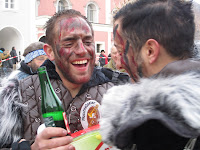Lent began mildly this year. The weather was mild and dry, but a pall like pewter hung over Katzenstraße. The wind, though not cold, had the bite of the Santa Ana winds of Southern California. The still-bare towering trucks in the wood bent under its breath; birdsong was temporarily muted under its roar.
Away in the distance, the multi-layered crags and peaks of Untersberg seemed crisper that Wednesday morning three weeks ago, lavender-blue and white with snow stark against the silver-white of the clouds behind it. Here and there the grey and white clouds parted, revealing weak soft blue. But between the heights of Untersberg and this flat by the still-brown wood, stretched kilometre after kilometre of what that morning seemed void.
Ever since Silvester, through the merry weeks of Fasching, Himself and I mentally prepared ourselves for Lent. Most years – the exception was last year, when our move from Ireland fell in the middle of the season – we have together made a specific Lenten sacrifice. This year we again picked up the tradition and are forgoing our ritual glasses of wine with dinner, our glasses of whiskey and beer afterward. It is an alcohol-free season for us.
During the three weeks since Ash Wednesday, we have borne with equanimity the blankness implicit in that morning. Outside of Lent, when I encounter the hard spots in the afternoon, those take-a-deep-breath-and-soldier-on grey drudgery moments, there is usually the promise of the glass of wine with dinner or the anticipation of evening’s light reflected through a golden glass of malt. Now, in the absence of that promise, I take a deep breath and think, ‘It is good for you to feel the blankness. It is good to let it go, if only for a while.’
It may be good, but it is hard. I feel it is not so much the absence of alcohol that causes the struggle but the absence, these days, of a sense of self. Perhaps it is the absence of the drive within myself to do something or complete something important. I am reminded that the blankness of being can be felt amid the beauty of Salzburg as it can be felt in urban sprawl or desert or anywhere.
‘Wherever you go,’ runs the enigmatic expression, ‘there you are.’ And there are times when one must bear the burden, unsoftened, of feeling what it is to be ‘there’.
The experience of this Lenten discipline changes every time we practice it. I find it works best for me when I willingly embrace it. There have been years when I’ve felt coerced. There have been years when just the everyday pain of life was penance enough. This year, I am conscious of feeling the difference of time, the contraction and expansion of the hours after dinner. As the weeks pass, I begin to feel differently this passage of time.
When I feel most restless and irritable with the exercise, I call to mind these words, from Mindfulness in Plain English by Bhante Henepola Gunaratana:
‘"Discipline" is a difficult word for most of us. It conjures up images of somebody standing over you with a stick, telling you that you're wrong. But self-discipline is different. It's the skill of seeing through the hollow shouting of your own impulses and piercing their secret. They have no power over you. It's all a show, a deception. Your urges scream and bluster at you; they cajole; they coax; they threaten; but they really carry no stick at all. You give in out of habit. You give in because you never really bother to look beyond the threat. It is all empty back there. There is only one way to learn this lesson, though. The words on this page won't do it. But look within and watch the stuff coming up – restlessness, anxiety, impatience, pain – just watch it come up and don't get involved. Much to your surprise, it will simply go away. It rises, it passes away. As simple as that. There is another word for self-discipline. It is patience."’
Now, Spring comes forth boldly. The birds chatter all day long, the days dawn bright and warm, the floor of the wood next to the house is carpeted with green, and the daffodils swell with yellow. Through the explosion of life, I am hanging in there. I try to allow myself to bear the blankness and know that the swelling yellow buds and green haze of the trees mirror something within myself. I am trying to give myself the gift of patience.




